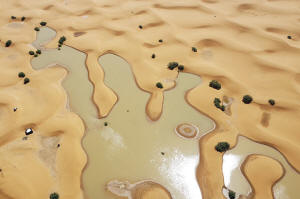|
Southeastern Morocco's desert is among the most arid places in
the world and rarely experiences rain in late summer.
The Moroccan government said two days of rainfall in September
had exceeded yearly averages in several areas that get an
average of less than 250 millimeters (10 inches) annually,
including Tata, one of the areas hit hardest. In Tagounite, a
village about 450 kms (280 miles) south of the capital Rabat,
more than 100 mm (3.9 inches) was recorded in a 24-hour period.
The storms provided more rainfall than had been seen in decades,
leaving striking images of bountiful water gushing through the
Saharan sands amid castles and desert flora.
In desert communities frequented by the many tourists who visit
the Sahara, 4x4s motored through the puddles and residents
surveyed the scene in awe.
“It’s been 30 to 50 years since we’ve had this much rain in such
a short space of time," said Houssine Youabeb of Morocco's
General Directorate of Meteorology.
Such rains, which meteorologists are calling an extratropical
storm, may indeed change the course of the region's weather in
months and years to come as the air retains more moisture,
causing more evaporation and drawing more storms, Youabeb said.
Six consecutive years of drought have posed challenges for much
of Morocco, forcing farmers to leave fields fallow and cities
and villages to ration water consumption.
The bounty of rainfall will likely help refill the large
groundwater aquifers that lie beneath the desert and are relied
upon to supply water in desert communities. The region's dammed
reservoirs reported refilling at record rates throughout
September. However, it's unclear how far September's rains will
go toward alleviating drought.
Yet water gushing through the sands and oases left more than 20
dead in Morocco and Algeria and damaged the farmers' harvests,
forcing the government to allocate emergency relief funds,
including in some areas affected by last year's earthquake.
NASA satellites showed water rushing in to fill Lake Iriqui, a
famous lakebed between Zagora and Tata that had been dry for 50
years.
__
Ahmed reported from Bamako, Mali.
All contents © copyright 2024 Associated Press. All rights
reserved |
|




